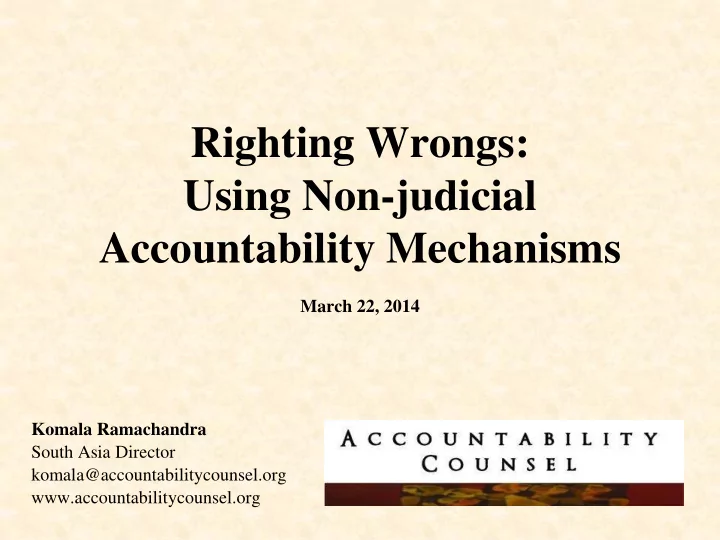

Righting Wrongs: Using Non-judicial Accountability Mechanisms March 22, 2014 Komala Ramachandra South Asia Director komala@accountabilitycounsel.org www.accountabilitycounsel.org
Accountability Counsel’s Model 1. Supporting Communities: Trainings and assistance with human rights and environmental complaints to non-judicial grievance mechanisms. 2. Policy Advocacy: Advocate for stronger existing accountability mechanisms so that accountability is attainable.
US Investment in Rural Mexico
US Government ’ s OPIC Government of Mexico OPIC Office of Accountability New York Investment Firm & Mexican Companies Communities Surrounding the Cerro de Oro Dam
Cerro de Oro Hydropower Project Social and environmental impacts
Lessons from Mexico • Social license to operate • Popular and political support • Participation of corporate decision-maker in negotiations
IFI and Other Accountability Mechanisms The World Bank Export Credit OECD National UNDP Group (Inspection Agencies (US, Contact Points GCF Panel & CAO) Canada, Japan) European Bank for Reconstruction & Development European Investment Bank Inter-American Asian Development Development Bank Bank African Development Bank
IFIs with a “Development” Mandate • The World Bank’s and ADB’s mandate is poverty alleviation, whereas mandate of EBRD is to foster the transition towards open and democratic market economies. • The model of development does not use a “rights - based” approach. Human rights and environmental abuses can be on a mass scale.
What Are Examples of Human Rights Abuses from ‘Development’ Projects? • Use of forced labor (oil pipeline) • Forced displacement of indigenous people (dams) • Contamination of waterways (mining) • Discrimination against women in project planning (oil palm/ agribusiness) • Denial of water resources causes outbreak of disease (water privatization)
Why Use IFI Non-Judicial Accountability Mechanisms • Often communities have been trying to resolve problems for several years (often severe problems) • No response at local, regional or even national level • No other accountability option (for a variety of case-specific reasons) • Transparency through reporting and monitoring are key aspects. * These mechanisms are not perfect; they are relatively new and still evolving.
Potential Benefits • Raising profile of a case: increasing national and international attention • Opportunity for documentation: complaint and other reports • Organizing and awareness raising among affected people • Gaining time and information • Changing procedures and approaches at a financial institution
Potential Drawbacks • Energy, resources, and time needed • Potential for failed negotiation or adverse findings • Loss of other opportunities to address an issue • Loss of momentum in a movement • Reliance on one mechanism • Retaliation
5 Steps to Filing a Complaint 1. Overall Strategic Considerations 2. Community Considerations 3. Technical Preparation 4. Write the Complaint 5. File the Complaint
Thank you. For more information about using accountability mechanisms, please contact Accountability Counsel. komala@accountabilitycounsel.org Accountability Resource Guide: www.accountabilitycounsel.org/resources
Recommend
More recommend